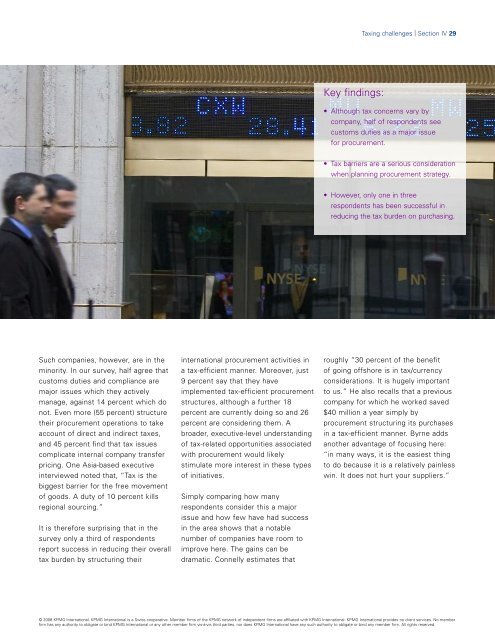Beyond purchasing
Create successful ePaper yourself
Turn your PDF publications into a flip-book with our unique Google optimized e-Paper software.
Taxing challenges | Section IV 29<br />
Key findings:<br />
• Although tax concerns vary by<br />
company, half of respondents see<br />
customs duties as a major issue<br />
for procurement.<br />
• Tax barriers are a serious consideration<br />
when planning procurement strategy.<br />
• However, only one in three<br />
respondents has been successful in<br />
reducing the tax burden on <strong>purchasing</strong>.<br />
Such companies, however, are in the<br />
minority. In our survey, half agree that<br />
customs duties and compliance are<br />
major issues which they actively<br />
manage, against 14 percent which do<br />
not. Even more (55 percent) structure<br />
their procurement operations to take<br />
account of direct and indirect taxes,<br />
and 45 percent find that tax issues<br />
complicate internal company transfer<br />
pricing. One Asiabased executive<br />
interviewed noted that, “Tax is the<br />
biggest barrier for the free movement<br />
of goods. A duty of 10 percent kills<br />
regional sourcing.”<br />
It is therefore surprising that in the<br />
survey only a third of respondents<br />
report success in reducing their overall<br />
tax burden by structuring their<br />
international procurement activities in<br />
a taxefficient manner. Moreover, just<br />
9 percent say that they have<br />
implemented taxefficient procurement<br />
structures, although a further 18<br />
percent are currently doing so and 26<br />
percent are considering them. A<br />
broader, executivelevel understanding<br />
of taxrelated opportunities associated<br />
with procurement would likely<br />
stimulate more interest in these types<br />
of initiatives.<br />
Simply comparing how many<br />
respondents consider this a major<br />
issue and how few have had success<br />
in the area shows that a notable<br />
number of companies have room to<br />
improve here. The gains can be<br />
dramatic. Connelly estimates that<br />
roughly “30 percent of the benefit<br />
of going offshore is in tax/currency<br />
considerations. It is hugely important<br />
to us.” He also recalls that a previous<br />
company for which he worked saved<br />
$40 million a year simply by<br />
procurement structuring its purchases<br />
in a taxefficient manner. Byrne adds<br />
another advantage of focusing here:<br />
“in many ways, it is the easiest thing<br />
to do because it is a relatively painless<br />
win. It does not hurt your suppliers.”<br />
© 2008 KPMG International. KPMG International is a Swiss cooperative. Member firms of the KPMG network of independent firms are affiliated with KPMG International. KPMG International provides no client services. No member<br />
firm has any authority to obligate or bind KPMG International or any other member firm visàvis third parties, nor does KPMG International have any such authority to obligate or bind any member firm. All rights reserved.



